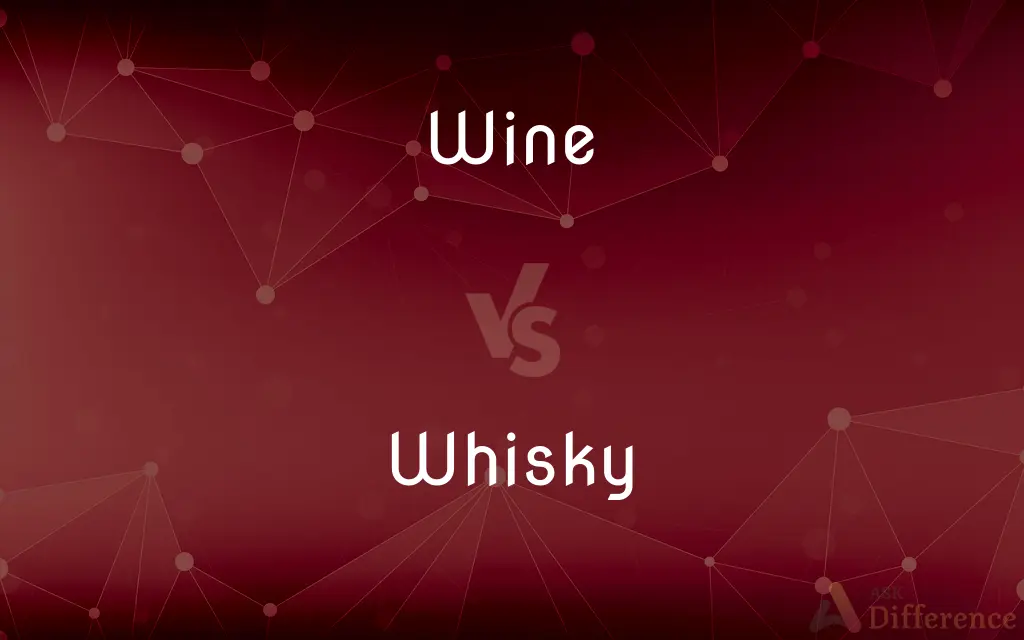Wine vs. Whisky — What's the Difference?
Edited by Tayyaba Rehman — By Fiza Rafique — Published on November 21, 2023
Wine is an alcoholic beverage made from fermented grapes, while whisky is a distilled alcoholic drink made from fermented grain mash. Wine reflects its grape and region, and whisky showcases its distillation and aging process.

Difference Between Wine and Whisky
Table of Contents
ADVERTISEMENT
Key Differences
Wine is a drink that has been celebrated for millennia, made by fermenting grapes. Whisky, on the other hand, is a distilled beverage made from fermented grain mash. The basic ingredients and the production processes for the two are vastly different, with wine relying mainly on the natural sugar of grapes and whisky on grains like barley, corn, or rye.
Wine often reflects the terroir, or the specific environmental conditions and geography where the grapes are grown. This means that wines can have a variety of flavors depending on the region and grape variety. Whisky, meanwhile, obtains its distinct flavor from the type of grain used, the distillation method, and the aging process, usually in wooden casks.
When discussing age, Wine can be consumed young or aged, with certain wines improving and developing flavors over time in the bottle. Whisky gains its character during the aging process in barrels, which imparts flavors, colors, and smoothness to the drink. An older whisky often denotes a deeper, richer flavor profile.
In terms of cultural significance, Wine has religious and ceremonial importance in many cultures and is often paired with food, considering its flavor profiles. Whisky holds a special place in many societies too, often enjoyed neat, on the rocks, or as a base in various cocktails.
Lastly, Wine usually has a lower alcohol content, ranging from 12% to 15% on average. In contrast, Whisky tends to be much stronger, with alcohol contents that can range from 40% to 50% and even higher for cask-strength variants.
ADVERTISEMENT
Comparison Chart
Origin of Word
From Latin 'vinum', meaning vine.
From Old Irish 'uisce', meaning water.
Primary Ingredient
Fermented grapes.
Fermented grain mash.
Production Process
Fermentation.
Distillation and aging.
Typical Alcohol %
12% - 15%.
40% - 50% (can be higher for cask strength).
Cultural Significance
Has religious and ceremonial importance in many cultures.
Often enjoyed neat or in cocktails.
Compare with Definitions
Wine
A fermented drink made primarily from grapes.
She enjoys a glass of wine with her dinner.
Whisky
A spirit that can be single malt, blended, or based on grain type.
I have a penchant for single malt whisky.
Wine
A beverage made of the fermented juice of any of various kinds of grapes, usually containing from 10 to 15 percent alcohol by volume.
Whisky
A beverage with distinct flavors influenced by distillation and aging.
This whisky has a vanilla undertone, likely from the barrel it was aged in.
Wine
A beverage made of the fermented juice of any of various other fruits or plants.
Whisky
A distilled alcoholic beverage made from fermented grain mash.
He sipped his whisky, savoring its smoky flavor.
Wine
Something that intoxicates or exhilarates.
Whisky
A drink aged in wooden barrels, acquiring color and flavor.
The whisky has a rich amber hue due to its time in oak barrels.
Wine
The color of red wine.
Whisky
An alcoholic liquor distilled from grain, such as corn, rye, or barley, and containing approximately 40 to 50 percent ethyl alcohol by volume.
Wine
To provide or entertain with wine.
Whisky
A drink of such liquor.
Wine
To drink wine.
Whisky
An alcoholic liquor distilled from fermented grain and usually aged in oak barrels.
Wine
An alcoholic beverage made by fermenting grape juice, with an ABV ranging from 5.5–16%.
Wine is usually stronger than beer.
"Wine improves with age but I improve with wine," she slurred as she slid gracefully beneath the table.
Whisky
A drink of this liquor.
Wine
An alcoholic beverage made by fermenting other substances, producing a similar ABV.
...dandelion wine, rice wine, plum wine...
Whisky
(historical) A light gig or carriage.
Wine
(countable) A serving of wine.
I'd like three beers and two wines, please. My friend will have the same.
Whisky
An intoxicating liquor distilled from grain, potatoes, etc., especially in Scotland, Ireland, and the United States. In the United States, whisky is generally distilled from maize, rye, or wheat, but in Scotland and Ireland it is often made from malted barley.
Wine
(uncountable) The color of red wine, a deep reddish purple.
Whisky
A liquor made from fermented mash of grain
Wine
Wind.
Whisky
An alcoholic drink often enjoyed neat or as a cocktail base.
Whisky on the rocks is his go-to drink.
Wine
(transitive) To entertain with wine.
Wine
(intransitive) To drink wine.
Wine
The expressed juice of grapes, esp. when fermented; a beverage or liquor prepared from grapes by squeezing out their juice, and (usually) allowing it to ferment.
Wine is a mocker, strong drink is raging, and whosoever is deceived thereby is not wise.
Bacchus, that first from out the purple grapeCrushed the sweet poison of misused wine.
Wine
A liquor or beverage prepared from the juice of any fruit or plant by a process similar to that for grape wine; as, currant wine; gooseberry wine; palm wine.
Wine
The effect of drinking wine in excess; intoxication.
Noah awoke from his wine.
Wine
Fermented juice (of grapes especially)
Wine
A red as dark as red wine
Wine
Drink wine
Wine
Treat to wine;
Our relatives in Italy wined and dined us for a week
Wine
An alcoholic beverage reflecting its grape variety and region of production.
The wine from Tuscany has a distinct taste.
Wine
A drink that can be red, white, or rosé, based on grape type.
I prefer red wine over white.
Wine
A beverage that pairs well with food, enhancing flavor profiles.
This wine complements the cheese perfectly.
Wine
A drink with cultural and ceremonial significance in various societies.
Wine plays a key role in many religious ceremonies.
Common Curiosities
How does the aging process affect wine?
Aging can enhance and develop a wine's flavors and aroma.
What grains are commonly used in making whisky?
Whisky can be made from barley, corn, rye, and wheat, among others.
Can wine be made from fruits other than grapes?
Yes, though grape wine is most common, there are wines made from other fruits.
How is whisky's strength determined?
Whisky's strength is determined by its alcohol content, which can vary greatly.
What are the main types of wine?
The main types are red, white, and rosé.
What is wine primarily made from?
Wine is primarily made from fermented grapes.
What determines the flavor profile of a whisky?
Factors include grain type, distillation process, aging period, and barrel type.
How long can wine be stored?
Depending on the type, wine can be stored for years, with some improving over time.
How important is the barrel in whisky production?
Barrels are crucial for whisky, imparting color, flavor, and character during aging.
Is older whisky always better?
Not necessarily. Age can influence flavor, but preference varies among individuals.
What's the difference between Scotch and whisky?
Scotch is a type of whisky made in Scotland, following specific regulations.
Are all wines meant for aging?
No, many wines are best consumed young, while some benefit from aging.
Can wine and whisky be mixed in cocktails?
Yes, both can be ingredients in various cocktails, though not commonly mixed together.
How do regions influence wine flavors?
Regions, or terroir, influence grape characteristics, which in turn affect wine flavors.
What's the significance of "single malt" in whisky?
"Single malt" means the whisky is from one distillery and made from malted barley.
Share Your Discovery

Previous Comparison
Lose vs. Loss
Next Comparison
Capital Structure vs. Financial StructureAuthor Spotlight
Written by
Fiza RafiqueFiza Rafique is a skilled content writer at AskDifference.com, where she meticulously refines and enhances written pieces. Drawing from her vast editorial expertise, Fiza ensures clarity, accuracy, and precision in every article. Passionate about language, she continually seeks to elevate the quality of content for readers worldwide.
Edited by
Tayyaba RehmanTayyaba Rehman is a distinguished writer, currently serving as a primary contributor to askdifference.com. As a researcher in semantics and etymology, Tayyaba's passion for the complexity of languages and their distinctions has found a perfect home on the platform. Tayyaba delves into the intricacies of language, distinguishing between commonly confused words and phrases, thereby providing clarity for readers worldwide.













































